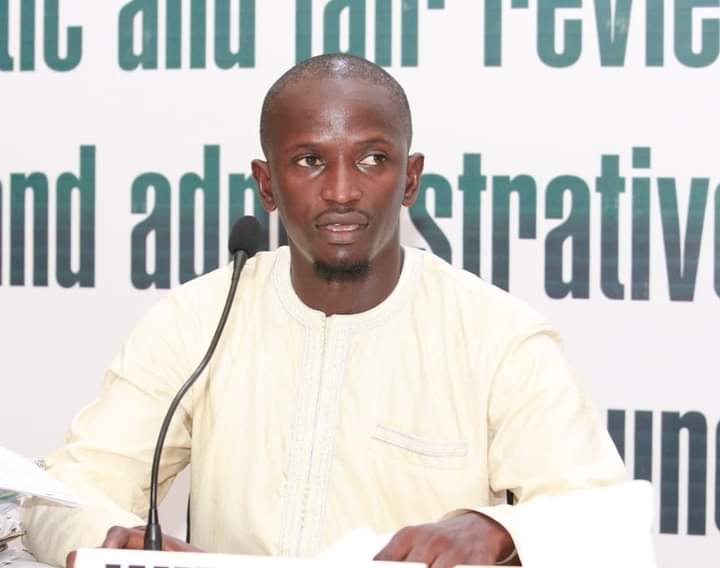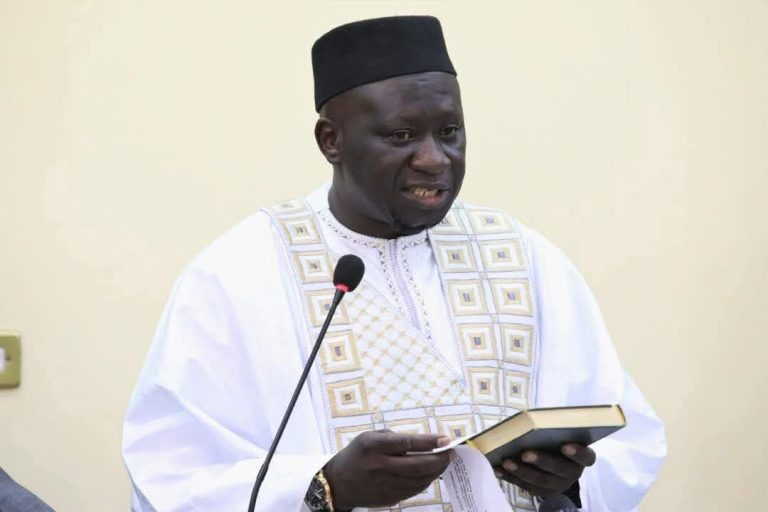
Karamo Ceesay, the Councillor of Tallinding South and the Chairman of the Kanifing Municipal Council (KMC) Finance Committee, was asked about the deleted records of transactions for the rates unit. He responded that he was part of the investigation and the matter was not concluded, and until now, the amount of D297,941.43 remains unaccounted as the investigation was abandoned. No one was held responsible for the missing records and funds as no one was indicted or found wanting.
Below is the detailed testimony of Karamo Ceesay before the Local Government Commission of Inquiry. The Commission is established to conduct full and impartial investigation into the administrative and financial operations of local government councils between May 2018 and January 2023 to enhance transparency and accountability.
He said the KMC used to have Finance and Audit Committee before setting up the Accounts Committee. The witness was a member of the Accounts Committee of the KMC. He is also a member of the Education Committee and ‘Waste’ Committee.
Section 3 of the Finance and Audit Act of 2004 provides that “A council shall keep a council’s development fund into which all revenue generated by council shall be paid and from which all liabilities falling to be discharged by the council shall be discharged.”
The witness was asked whether the KMC complied with the provision of the law. Karamo Ceesay said the KMC had a budget officer around 2020 and 2021.
“Do you think your failure to have a budget officer should exempt you from complying with the provision of the law?” Chairperson Jainaba Bah asked.
The witness said the KMC has several operational accounts, but he is not aware of any account specific to the Fund of Council as stated above.
The witness was asked about the disbursements made to the wards by the KMC. He said each year, from 2019 to 2023, the KMC allocated D200,000 to each ward development committee to use for light projects, specifically on roads. He explained that the only year the funds were not transferred to the ward accounts was in 2019. In that year, the wards identified the projects, and the council implemented it directly. He stated that the reason for the council implementing projects directly was because none of the wards have a ward development account for the funds to be transferred in.
The Commission noted that the Council had made several payments as honorarium, and the witness was asked about his understanding of honorarium and the provision of law that allows them to pay honorarium.
The witness was referred to Chapter 5 of the Financial Manual for Local Government Councils dealing with ‘payment of expenditure.’ Reference was made to Section 501, which talks about ‘type of payment.’ It provided for 12 main categories of payment – utilities, staff salaries and wages, allowance for councillors, transport and travelling allowance for staff, utilities (telephone, electricity and water), purchases and supply, minor works, maintenance of vehicles, equipment and generator, maintenance of building, maintenance of furniture, fuel and lubricants, rent, bank charges and any other expenditure.
“Is honorarium there?” Chairperson Jainaba Bah asked.
“It is not here,” the witness replied.
The witness was asked about the deletion of financial records relating to the rates collection. Karamo Ceesay said he was aware of it, adding that the matter was investigated. He testified that former acting deputy director of finance (Sheriff Njie) wrote a memo and addressed it to the office of the Mayor regarding the delegation of records that happened in the Matrix System, and the Mayor also minuted the memo two committees (Finance Committee and Establishment Committee) to look into the matter. He said the investigation took two (2) days in which they interrogated the software developer, the cashier, and the IT manager. He explained that the cashier’s explanation was not convincing to the committee while the software developer was not able to show who deleted it because the Matrix System could not show who logged in and the times. He further syayed that the IT manager said his user rights were limited as he does not have the exclusive user rights. Karamo said the IT Manager informed the inquiry team that the software developer once came to the KMC with his laptop and requested to login into the server, which was granted and since after that, his user right was limited. He added that during the course of the investigation, the IT manager resigned and was unreachable while the cashier was moved. The inquiry team recommended the “super user rights” [referring to exclusive user rights] to be given to the CEO. The witness said the investigation was not concluded because the IT manager resigned when he knew he was suspected of having user rights, and after his resignation, he became unreachable.
“When we call him, we could not get him. So many issues happened at the time. I learnt that he was going to school at the time. He was having issues with our director of admin, and for us to call him directly may not tell well,” Karamo said.
A photo of a letter sent to the Chairperson of the National Assembly FPAC dated 13 March 2023 regarding the joint investigation of the Finance Committee and the Establishment Committee of the KMC regarding the missing funds amounting to over D297,941.43.
Karamo said the investigation was not concluded contrary to the management response contained in the audit report. He added that the IT manager was the system administrator and had access to the server. He could be the only one who could delete it. Karamo said the Matrix System does not have what is referred to as the “audit trail” to show who logged into the system and their timing. He added that the team that investigated the matter were not involved or consulted by the KMC when writing their response to the audit query. Lead Counsel Patrick Gomez told the witness that the investigation should have been concluded on whether they indicted someone or not.
“Put your findings in a report and have a conclusion. It is either X, Y and Z will be held responsible, or X, Y, and Z cannot be held responsible. You must have a report. You must have a conclusion. Your report can indict someone or not indict them. Your report can confirm X, Y, and Z should be held responsible or state clearly that you cannot confirm it based on a set of facts, but you must have a report,” he said.
“That is true,” the witness said.
Karamo Ceesay further stated that the “guy” was confronted and he told the joint committee that he had used the money on an emergency and he had repaid about D43,000 or D45,000 and was left with the balance of over D145,000. He said the idea of moving him from the cashier’s office was to stop him from handling cash and once he completed the payment, he would have been redeployed at a place where he would not have access to cash.
“A few weeks later, the “guy” was asked a letter of apology, and he wrote it. He promised to pay back the money, but out of surprise, we were notified that he was sacked and went with Council’s money,” Karamo said.
Lead Counsel Gomez said reiterated that all that information should have been recorded in the report of the joint investigation. Karamo agreed with the counsel that there should have been a report.
The discussion moved to the issues of the internal audit reports by the Internaal Audit Department of the KMC. Karamo said the council had held a discussion on some of the audit reports, but he is not sure whether the reports mentioned by Lead Counsel Gomez were part of them.
“I asked you questions in relation to your exercises, and you said you could not find fraud. These reports have clearly outlined several fraudulent allegations, several,” Counsel Gomez said.
The witness said the Accounts Committee of the KMC was not holding meetings like other committees.
“Mr Ceesay, was Council taking actions in relation to fraudulent allegations or findings either by the National Audit Office or the Internal Audit Department?” Gomez asked.
Ceesay said that when the audit reports are prepared, they are not forwarded to his committee to take steps. Lead Counsel Gomez referred the witness to section 24 subsection 6 of the Local Government Finance and Audit Act which provides that “A local government accounts Committee shall examine the reports of the Auditor-General, the Internal-Auditor and any other reports in relation to the finances of its Council.”
Karamo maintained that the reports were not forwarded to the committee. He said the Accounts Committee does not sit frequently. He added that the law requires the Internal-Auditor to submit quarterly reports to the Accounts Committee, which was not happening.
“That is true. But if you cannot act on the periodic reports, you won’t have the time for quarterly reports,” Gomez said.
“Yes, it will be difficult,” the witness said.
“So, you people used that as a cover-up but that would be unfair to the people who pay taxes to say he [Internal-Auditor] did not do his job well and that was why I acted this way. Mr Ceesay [Internal-Auditor] has been doing his job on some occasions, but you never acted in the way you are supposed to act as Council. Most of it, there were no actions taken,” Gomez said.
“We, the elected officials, our hands are tied to take certain decisions. Certain decisions you take at the council level and you take it to people for them to act, it is difficult to act,” Karamo replied.
On the Matrix System, the witness said the system is not properly organised. He explained that the names of the properties and their numbering are not organised.
“It makes the work very difficult,” he said.
The witness was handed they’ve internal audit quarterly report covering January to March 2021. The report indicated that the witness was copied. The auditors indicated that they reviewed the invoice issued register collected from the License Manager covering 1 January to 19 March 2021. The total invoice issued was 5911, and the total value of the invoices served is D70,035,995.50. The auditors noted that from that amount, only D40,988,885.70. The total outstanding amount is D29,047,139.70.
The auditors also looked into the daily market books and came up with their findings covering 1 January to 15 February 2021 for 15 markets. The total packets of tickets collected were 330, and the total value was D3,300,000. The auditors found out that 292 packets of ticket books were sold for D2,920,000. 38 packets of tickets remain, and the remaining value was D380,000. On the canteens, the auditors said the total number of permanent canteens was 828, and the amount to be collected from them was D848,350. The total number of temporal canteens was 1700, and the total arrears for the temporal canteens was over D1.7 million.
The witness was asked to find out whether the balances were collected and provide the Commission with the information.




